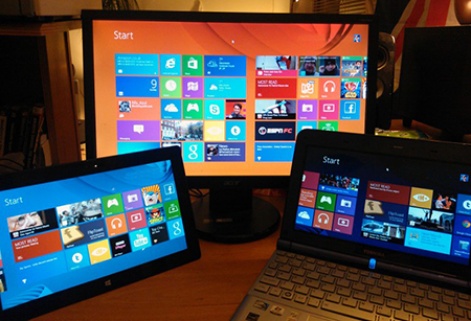Can such growth continue indefinitely?
'Biggest', then, might be the wrong word. 'Most important' is probably a better way of putting it.
In my view, the next 12 months will play host to the seismic changes this relatively fresh sector has seen to date. The problem is, this industry moves so fast there are so many new ventures, ideas and strategies billed as the 'next big thing' that it's hard to know what's going to stick and what isn't.
There are some certainties that we can call now, however.
Undoubtedly, we're going to see some major players platforms, publishers, developers run into major trouble and fall away. More important than all of this, however, is what platforms people play on, and how they play.
These issues will prove to be 2013's legacy.
Rise and fall
This is not news, either.
Executives at the top of both RIM and Microsoft and, by association, Nokia know that 2013 is the year that their respective strategies (that both are betting the farm on) will either prove their worth, or fall far short.
For RIM, the delayed BlackBerry 10 has quickly become something of a last stand, even if that's not how the company itself would pitch it.
Until now, RIM has been playing catch up ever since the App Store launch in 2008. Always adding features after its rivals, and never leading the market.
Indeed, the whole concept of app marketplaces, open email and everything else Apple and co. brought to the table has been an uncomfortable fit for the Canadian giant. BlackBerry 10 is an attempt to jump back ahead, and could be the reset button the company needs.
Or, on the other hand, it could prove to be neither one thing nor the other neither consumer focused, nor tailored enough for enterprise. What it isn't, however, is without hope.
The common misconception some of even the most refined minds make in the industry is that Apple and Google's combined lead is secure, ininsurmountable. The very nature of the mobile market and one pushed by all involved is that consumers both want and need to upgrade their handsets every 12, 18 or 24 months.
However strong you may think your ecosystem is, by building in traps such as that, you're effectively handing consumers a way out at least once every two years.
The end result is a fluid consumer base, and a race between platform holders that's never going to come to a conclusion. This is a contest that, for better for worse, is eternally wide open.
Looking through the window
That doesn't mean the risk Microsoft has taken attempting to bring all its platforms together is a small one, however.
No doubt, Microsoft will have been hoping the launch of Windows 8 would have come after its close cousin, Windows Phone, had made significant inroads into the smartphone market.
That hasn't happened, and instead, Windows 8 is almost coming to the rescue, using its already sizeable userbase to help give Windows Phone some momentum, rather than build on it.

The potential is there, then, for an unsuccessful Windows Phone to undermine Microsoft's core business Windows.
Likewise, a strong and closely linked Windows 8-Windows Phone 8 assault (with a bit of notable help from Xbox) on iOS could help Microsoft offer services Apple simply can't muster. The decision to deploy its fiercest weapon certainly makes sense, but it also raises the stakes, somewhat.
Will Windows survive? Will it tip the balance in Microsoft's favour? All we know is, 2013 will be the year when we find out whether consumers want to play ball.
Android, too, faces its own challenges most notably how to support multiple OEMs when one Samsung is sweeping away all competition. Don't be surprised if 2013 sees other currently Android-focused manufacturers follow HTC's line and begin to entertain some of its rivals.
Look out for Tizen, Firefox and, in 2014, Ubuntu as well. As carriers and OEMs increasingly look to reinforce their brands and rest power back from the platform holders, so Android's open approach will likely be adopted - and maybe bettered - by others.
Playing the game
Microsoft's move, however, is one that directly taps into what could prove to be the main trend of the year: How we play.
2012 through the rise of freemium, in-app purchases and crowdfunding saw developers contend with a major shift in the way their games make money. 2013 is likely to see the way consumers take on their titles thrown up into the air, too.
No-one knows what new bits of tech platform holders have up their sleeves, but platform convergence from smartphones and tablets to televisions and consoles will become a reality this year.
Google will need to serious bolster Google TV if it is to serve as the default app platform before the (inevitable) launch of Apple's alternative.
Meanwhile, the roll out of the next Xbox will see Microsoft putting into action all the hard lessons it has learned from the activities of its rivals in the mobile market.
Xbox will increasingly become a games platform rather than a piece of hardware, with the same games played across TV, smartphones and tablets. SmartGlass really is just a test run.
But, more than anything, this is the year when Apple's app platform for TVs has to launch.
Whether it simply attempts to port over iOS releases or launches fresh with a toolset specifically for television controls is a secondary issue right now after all the hype, this is a race Apple needs to be in.
That's because and prepare yourself, folks this mobile market we've just got to grips with is about to 'go large'.
It may not become the norm in 2013, but this will known as the year when smartphone games dropped the 'mobile' tag altogether and started launching across multiple form factors at the same time.
What this means for small studios only just able to contend with working on one OS or one device is anyone's guess, but the overwhelming success of the smartphone market over the last 5 years means this is a game that everyone is going to want to play in 2013.
























